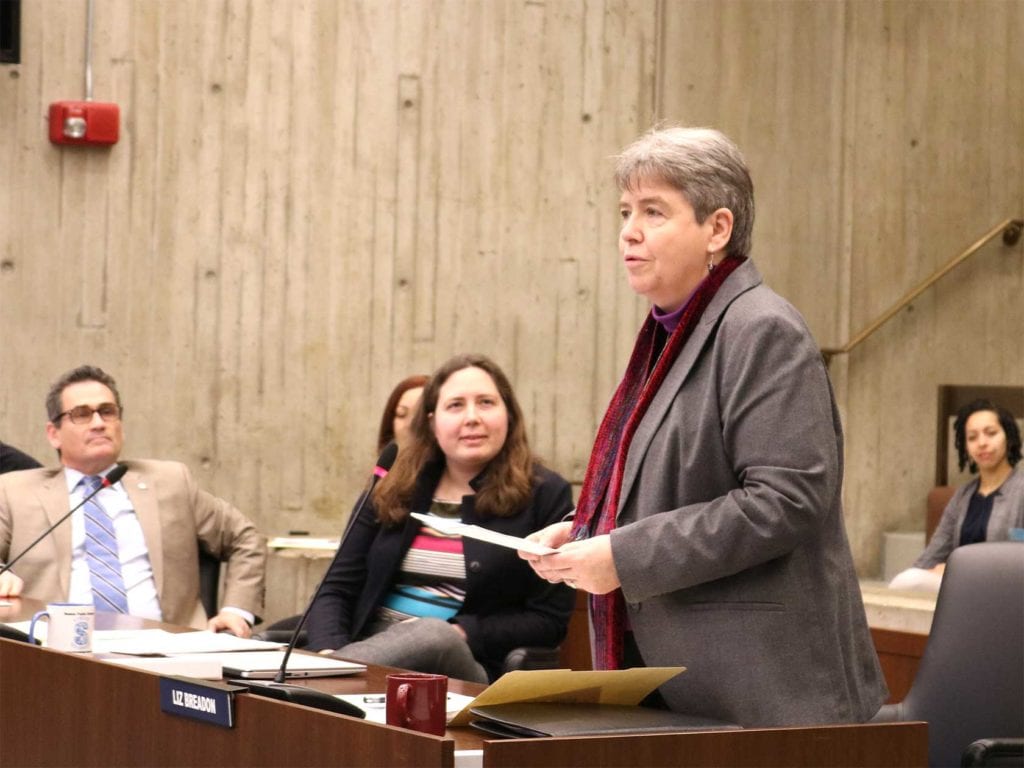
With the November presidential and congressional election looming on the horizon, city councilors are examining the possible expanded use of mail-in voting in Boston and the challenges it may present, including language access.
“We should be operating in a system that makes it as easy as possible for people to vote, regardless of what language they speak,” said Councilor Julia Mejia during the May 13 online council meeting.
Councilors Mejia and Liz Breadon authored a resolution to affirm the provision of bilingual ballots for upcoming elections.
Breadon said that the city of Boston is mandated to provide bilingual ballots and voting materials in Spanish. The administration has voluntarily provided bilingual ballots for Chinese and Vietnamese voters over the past few years, but only at polling stations.
“These bilingual ballots are only available at the physical polls,” said Breadon. “The state does not have the practice of mailing bilingual absentee ballots in these languages.”
Experts at the Centers for Disease Control and Prevention have encouraged vote-by-mail to minimize contact with others. Crowded polling locations will become health hazards if the Covid-19 pandemic persists.
Mejia said she doesn’t feel comfortable sending people into public spaces when it’s possible to provide mail-in ballots.
“There’s a real chance that unless we act quickly, members of our Chinese and Vietnamese community will have to physically visit a poll site in order to vote during this election,” she said.
Councilor Matt O’Malley said that he was “passionate” about pushing for a vote-by-mail in both the September primaries and November election. The process should be as safe and inclusive as humanly possible, he added.
Mejia also said that any ballot translation should be “culturally competent.”
“It’s time we lead with an all-means-all mentality,” she said.
Expanding stimulus benefits
The council also discussed stimulus payments for immigrant residents. While non-essential businesses in Massachusetts remain closed, almost a million residents have filed unemployment claims. Federal stimulus funds only reach so far.
“The federal stimulus checks that went out earlier this spring were not given to families in which any member does not have a Social Security number,” said Councilor Kenzie Bok. Bok authored a resolution supporting an Act to Provide Equal Stimulus Checks to Immigrant Taxpayers.
Many workers pay the same share of income taxes as those with a Social Security number, said Bok, through the use of an individual taxpayer identification number.
“Those families deserve and need the assistance that the federal government has neglected to provide them,” she said.
Celebrating culture
In other council news, Councilors Anissa Essaibi-George and Michelle Wu recognized May’s cultural commemorations.
Essaibi-George noted that May is Haitian Heritage Month. Massachusetts has the third largest population of Haitian immigrants in the United States, she said, and Boston is home to over 100 Haitian businesses and cultural organizations.
She also acknowledged the contributions of Haitians during the pandemic.
“Our Haitian residents make up a large population of our medical professionals and essential workers,” she said. “In the midst of the COVID-19 pandemic, they have been on the frontlines of our response.”
Councilor Ricardo Arroyo noted Haiti’s historic achievements. In the early 19th century, Haitian slaves led by Toussaint Louverture revolted against colonial rule. Haiti is known as the world’s first black-led republic and the first independent Caribbean nation.
May is also Asian American and Pacific Islander Heritage Month. Wu specifically recognized May 18 to memorialize the life and death of Vincent Chin, a Chinese American who was beaten to death by two white men in Detroit in 1982. Monday would have been Chin’s 65th birthday. Wu said that this hate crime fueled a national Asian American activist movement. Organizations across the country are still fighting for Asian American rights today.
“The Asian American story is the American story,” said Councilor Lydia Edwards. “It is part of our fabric; it is part of our DNA.”
Edwards noted that during the pandemic, people are looking for someone to blame. Nationwide misconceptions about the coronavirus have led to thousands of anti-Asian hate crimes.
Councilor Ed Flynn said, “We are seeing a lot of hate crimes, we’re seeing a lot of bullying, we’re seeing a lot of intimidation across the country. It’s important for us to continue to speak up as a body against any type of discrimination.”






